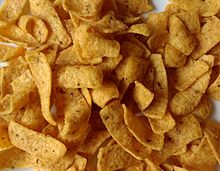| This article needs additional citations for verification. Please help improve this article by adding citations to reliable sources. Unsourced material may be challenged and removed. Find sources: "Fritos" – news · newspapers · books · scholar · JSTOR (March 2016) (Learn how and when to remove this message) |
| [REDACTED] | |
 Bunch of Frito chips Bunch of Frito chips | |
| Product type | Corn chip |
|---|---|
| Owner | PepsiCo (via Frito-Lay) |
| Introduced | 1932; 93 years ago (1932) |
| Related brands | Doritos Tostitos Cheetos |
| Website | fritos.com |
Fritos is an American brand of corn chips that was created in 1932 by Charles Elmer Doolin and has been produced since 1961 by the Frito-Lay division of PepsiCo. Fritos are made by deep-frying extruded whole cornmeal, unlike the similar tortilla chips, which are made from cornmeal and use the nixtamalization process (known as masa). It is one of two brands representing Frito-Lay along with Lay's. The Fritos brand also appears on a line of cheese sauces and bean dip.
Origins
Frito means "fried" in Spanish.
According to the Handbook of Texas, published by the Texas State Historical Association:
The Frito Company was born in 1932 at the height of the Great Depression. The family of Charles Elmer (C. E.) Doolin (1903–1959) owned the Highland Park Confectionary in San Antonio, and Doolin, twenty-eight at the time, wanted to add a salty snack to their repertoire. He responded to an ad in the San Antonio Express. The ad, placed by Gustavo Olguin, listed for sale an original recipe for fried corn chips along with an adapted potato ricer and nineteen retail accounts. Doolin bought the small business venture for $100, and began to manufacture the chips in his mother’s kitchen with the help of his father, Charles Bernard Doolin; mother, Daisy Dean Stephenson Doolin; and brother, Earl Doolin. These four founders made up the first board of directors, with Charles Bernard Doolin serving as the first chairman.
The Doolin family began selling Fritos in 1932 under the name of the Frito Corporation, located first in their garage; they soon bought the house next door to expand their operation. In 1933–34, they opened plants in Dallas and Tulsa. In 1936, Fritos were displayed at the Texas Centennial Exposition and the exhibit was moved to the 'Castle of Foods' during the 1938 State Fair of Texas. By 1947, the company had plants in Los Angeles and Denver, and licensed franchises nationwide, including H. W. Lay and Company, which had an exclusive franchise to produce and sell Fritos in the Southeastern United States. As its business expanded, the Frito Company also produced other items, including Cheetos (1948), chili, bean dip, tortilla chips, and other Mexican-inspired treats, along with potato chips, roasted peanuts, fried pork skins, and other snack-food products.
By 1955, the company owned more than fifty production plants, including ones in Hawaii and Venezuela, as well as a number of "Frito farms" across Texas, where Doolin grew corn and other crops for use in his products. The Frito Company was one of the first to invest in Disneyland, and from the park's opening in 1955 had a Casa de Fritos Restaurant there. In 1961, the Frito Company merged with H. W. Lay and Company to become Frito-Lay. In 1965, Frito-Lay merged with the Pepsi-Cola Company to become PepsiCo, one of the world's largest producers of soft drinks and snack foods.
According to Smithsonian magazine, C. E. Doolin did not eat meat or salt and was a follower of fellow Texan Herbert M. Shelton, a naturopath who advocated raw foods and fasting as a cure for diseases.
Company mascots
From 1952 to 1967, the Frito Kid was the company's official mascot, designed by Keitz & Herndon. The Frito Bandito was its mascot from 1967 until about 1971, and was discontinued due to complaints about the racist Bandito image. He was initially replaced by the Muncha Bunch, a group of cowboys, which then were replaced by W.C. Fritos, modeled after comedian W. C. Fields.
See also
References
- Spanish to English: Frito
- Doolin, Kaleta. "Frito-Lay Corporation". Handbook of Texas Online. Texas State Historical Association. Retrieved 5 November 2017.
- The Kitchen Sisters (18 October 2007). "The Birth of the Frito". Morning Edition. NPR. Retrieved 18 November 2012.
- Doolin, Kaleta. "Doolin, Charles Elmer (C. E.)". Handbook of Texas Online. Texas State Historical Association. Retrieved 5 November 2017.
- Smith, Peter. "Frito Pie and the Chip Technology that Changed the World (January 30, 2012)". Smithsonian. Smithsonian Institution. Retrieved 6 November 2017.
- "Frito Kid and Deeee-licious Fritos!". Imagineering Disney. 2010-06-26. Retrieved 2012-10-22.
- Elliott, Alan C. (2016). Texas Ingenuity: Lone Star Inventions, Inventors & Innovators. Arcadia Publishing. p. 159. ISBN 9780738503561 – via books.google.com.
- Elliott, Alan C.; Summey, Patricia K.; Kokel, Gayla Brooks (2009). Oak Cliff. Arcadia Publishing. p. 87. ISBN 9780738570686 – via books.google.com.
External links
| PepsiCo | ||||||||||||
|---|---|---|---|---|---|---|---|---|---|---|---|---|
| Brands and subsidiaries |
| [REDACTED] | ||||||||||
| Other holdings | ||||||||||||
| Former holdings and products | ||||||||||||
| People |
| |||||||||||
| Related articles | ||||||||||||
| ||||||||||||